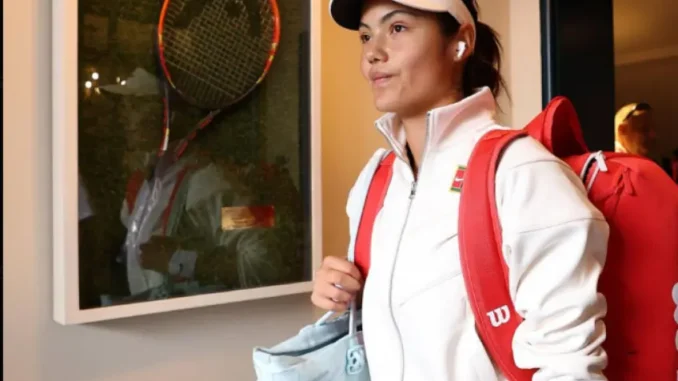
Emma Raducanu, Britain’s 22-year-old tennis star and 2021 US Open champion, found herself at the center of a heated controversy after sharing her perspective on the ongoing debate over equal prize money in professional tennis. Speaking ahead of her campaign at the 2025 HSBC Championships at Queen’s Club, where she reached the quarterfinals, Raducanu’s comments sparked outrage among fans and players alike, reigniting discussions about gender pay disparities in the sport. Her decision to remain noncommittal on the issue, despite her status as a high-profile athlete, has drawn sharp criticism, highlighting the complex dynamics of advocacy and personal choice in tennis.
The Queen’s Club Championships marked a historic moment, with the WTA 500 event returning to London after a 52-year absence, featuring stars like Madison Keys, Elena Rybakina, and British number one Katie Boulter alongside Raducanu. However, the tournament also underscored stark financial disparities: the women’s prize pool stood at $1.415 million, a record for a WTA 500 event of its size, but paled in comparison to the men’s ATP 500 event, which offered over $2.89 million. When pressed on the issue, Raducanu expressed reluctance to engage, stating, “There is obviously a big difference [in prize money], and I’m sure a lot of players will kind of say their piece on it, but I just prefer not to get involved and just whatever the situation is I’ll kind of roll with it, but I’m never really going to take a stand either way.” She added, “I kind of just get on with it and I don’t feel like I really am playing for money,” emphasizing that her motivation lies in competition, not financial gain, though she acknowledged the high costs of sustaining her team.
Raducanu’s remarks, initially made to a Sky Sports reporter, went viral after being reshared by the Tennis Weekly Podcast, triggering a firestorm of reactions. Critics argued that her neutrality sidesteps the legacy of trailblazers like Billie Jean King and Venus Williams, who fought tirelessly for equal pay, achieving parity at all four Grand Slams by 2007. “We need to make tennis available for poor people because these girls all come from rich families and don’t care enough to fight for the money women deserve,” one fan wrote on social media, reflecting a sentiment that Raducanu’s financial security—bolstered by $5 million in career prize money and lucrative endorsements with brands like Nike, Porsche, and Dior—diminishes her incentive to advocate for less privileged players. Another commented, “Let’s ask her again when the sponsors’ cheques stop coming in,” questioning her stance’s longevity.
The backlash contrasts with Raducanu’s earlier comments in 2024, when she criticized the prize money gap at the Italian Open, saying, “The prize money gap is huge on the ATP Tour, which I don’t necessarily think is fair, but equally playing three sets in the slams is a lot better than the men’s five, which is brutal.” This apparent shift to a noncommittal stance has fueled accusations of inconsistency, with some fans labeling her approach “individualistic.” Yet, supporters defend her honesty, arguing that expecting a young athlete to lead every cause is unfair, especially given her challenges, including a back injury that forced her withdrawal from the 2025 Berlin Open and a traumatic ordeal with a “fixated fan” earlier in the year.
Raducanu’s 2025 season has shown promise, with a 15-12 record, two quarterfinal appearances, and a climb to world number 36, a significant recovery from injury-plagued years following her historic US Open win as a qualifier. The Lawn Tennis Association’s commitment to equal prize money at Queen’s and Eastbourne by 2029 offers hope, but the current gap remains a sore point. As peers like Coco Gauff, Naomi Osaka, and Serena Williams champion equality, Raducanu’s reticence stands out, raising questions about whether her influence could drive change. For now, as she prepares for Wimbledon, her focus remains on the court, but the debate her comments have sparked underscores the persistent fight for equity in tennis.
Leave a Reply